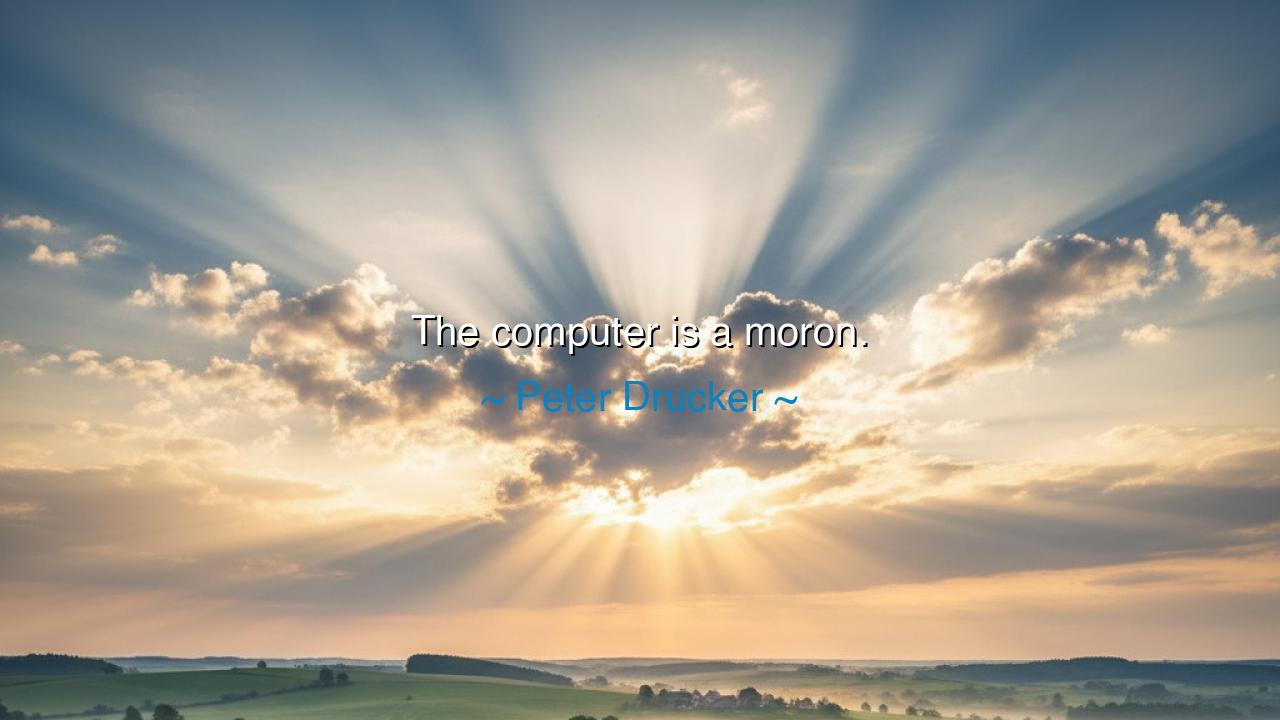
The computer is a moron.






Peter Drucker’s words, “The computer is a moron,” may sound stark and harsh, but they carry a profound truth about the limits of technology and the wisdom of the human mind. Drucker, the great management consultant and philosopher, recognized that while computers are powerful tools, they are ultimately empty vessels, incapable of understanding or insight. They process information but do not possess the capacity for true creativity, intuition, or judgment—qualities that define human intelligence. In this statement, Drucker points to a truth that ancient wisdom knew well: tools—whether they are weapons, instruments, or machines—are only as wise as the minds that wield them.
In the ancient world, tools were crafted with great care and skill, but even the greatest craftsmen knew that tools were only extensions of human will. The bow and arrow, the sword, or the plow could do great work, but they required the guidance of a human hand, a human mind, to fulfill their purpose. The ancient Greeks, for example, saw knowledge and wisdom as the true driving forces behind creation. Philosophers like Socrates and Plato recognized that the mind—shaped by reason, experience, and reflection—was the true source of power. The tools that we create, in their view, were not the agents of change; rather, they were instruments of the human spirit. Drucker’s quote reflects this ancient understanding, reminding us that no matter how powerful the computer may be, it remains an instrument that requires human guidance.
Consider the story of Archimedes, the great Greek mathematician and inventor, who used his brilliant mind to create innovations that changed the course of science and engineering. Yet, even Archimedes’ most advanced inventions, like the screw and the claw of Archimedes, were simply tools—extensions of his intellectual ability. Without Archimedes’ mind to guide them, those tools would have been as useless as any modern machine without human direction. Technology, in the hands of humans, can become a force for good, but without the wisdom to guide it, it remains nothing more than a tool with limited purpose.
The computer, as Drucker suggests, is a moron in the sense that it lacks the human faculties—such as intuition, empathy, and understanding—that allow us to create meaning and value in the world. It may calculate and process, but it does not understand. The ancient philosophers warned of the dangers of relying too heavily on tools that can replace human judgment. In Plato’s "Republic", the idea of rulers (or philosopher-kings) was central to the idea that wisdom and reason must govern—not tools, not machines, but minds cultivated through education and experience. Today, we find ourselves in a similar situation: as technology advances, we must ensure that human wisdom continues to guide it, and that the tools we create do not replace us, but serve us.
We also see this tension reflected in the story of Henry Ford and the creation of the assembly line. Ford’s invention of the assembly line revolutionized manufacturing, but the true genius of the invention was not just in the mechanical process but in Ford’s vision—his understanding of how the tool could maximize efficiency while maintaining the human element in the production process. Ford understood that machines, no matter how efficient, needed human insight to guide them toward purposeful outcomes. This principle applies today: computers and automation can accomplish remarkable feats, but they remain, as Drucker suggests, morons—they require human direction to achieve meaningful goals.
Drucker’s insight is also a call to the future. As we continue to advance technologically, we must be mindful of the limits of our creations. The future of technology is not about creating machines that think for us, but about creating machines that serve us, that empower human potential, and that amplify our ability to create, understand, and improve the world. The ancients believed in the power of the human mind, and modern technology must not diminish that power, but rather enhance it. The computer, like any tool, should be subservient to human wisdom, not the other way around.
Lesson for the ages:
Tools are powerful, but they are empty without the guiding hand of wisdom. The computer, like the sword, the plow, or the wheel, is merely an extension of the human mind. It may be capable of extraordinary feats, but it cannot replace the intellect, the creativity, or the wisdom that are essential for true progress. Just as the ancients revered the human mind as the source of wisdom, we must continue to honor the mind’s role in guiding technology and ensuring it serves the greater good.
Practical Action:
As you engage with technology in your own life, remember the lesson of Drucker’s words. Use the computer, the internet, and all the other tools at your disposal, but do not let them replace your ability to think, to create, and to act with purpose. Let machines serve as extensions of your vision, but never forget that it is your wisdom and understanding that give them meaning. As the ancients knew, true progress lies not in the tools themselves, but in how we use them to shape the world for the better.






AAdministratorAdministrator
Welcome, honored guests. Please leave a comment, we will respond soon